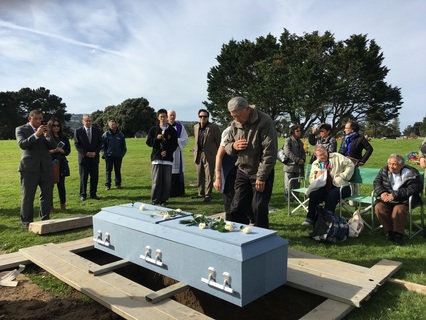 Arnold Low, who with his wife Jean brought Thomas food every morning for 20 years, prays at the homeless man's graveside.
Arnold Low, who with his wife Jean brought Thomas food every morning for 20 years, prays at the homeless man's graveside. Today’s daily Mass gospel is a briefer version of the Sunday Gospel ten days ago, when we began wrapping up the liturgical year by considering the Last Things. “By your perseverance,” Jesus says “you will secure your lives.” We all want security, but perseverance can be difficult in hard times. Overall, however, it is not that difficult. We need to only rise each morning to the simple tasks God asks of us: wash up, say our prayers, eat a good breakfast, and go to work. At work God asks us to smile at each other, and to help each other build a civilization of love. Our King is with us, and within his reign we are safely provided for.
The Feast of Christ the King
Last Sunday the Church celebrated Cristo Rey: Christ the King. We remember our dear Carmelites at Cristo Rey monastery up the street, founded by refugees from the persecutions in Mexico in the 1920s. Many were martyred in those years with the cry of Viva Cristo Rey on their lips, “long live Christ the king.” Pope Pius XI instituted this feast in 1925 after World War I made it terrifyingly clear that universal devastation is the price we pay for denying Christ’s Kingship. “These manifold evils in the world,” he wrote as the world braced for a second war, “are due to the fact that the majority of men have thrust Jesus Christ and his holy law out of their lives; [with] no place either in private affairs or in politics: as long as individuals and states refuse to submit to the rule of our Savior, there will be no really hopeful prospect of a lasting peace among nations.”
Love frees
On Sunday we saw Christ reigning from the cross, below the inscription in Latin, Hebrew, and Greek Jesus Nazarenus Rex Ideorum, the acronym of which you see on every Catholic crucifix (INRI). Pontius Pilate hung that sign above Christ’s crucified body, intending to mock him with the “jeering” Roman soldiers: “This is what the Jews call a king! How many armies does he command?” For this world’s politics, “king” means power. Armored divisions. Fighter jets. Control of economic production and delivery systems. Power over public opinion. But this King, reigning from a tree, is a different kind of ruler. “The feast of Christ the King is not therefore a feast of those who are subjugated,” writes Pope Benedict, “but a feast of those who know that they are in the hands” of one who loves them. We are all free subjects of this Kingdom, because love is freely chosen and frees him who trustfully subjects himself to the lover. We have, sadly, lost much of our loving trust in God. And as we lose this trust, we become more desperate to control our environment.
Potter’s Field
Yesterday I buried Thomas Myron, a homeless man who was much beloved here in our neighborhood. 700 people came to his funeral Mass two weeks ago; the local funeral home and our Catholic cemetery donated much of his burial expenses. The funeral was featured on the front page of Catholic San Francisco, and by all accounts our street person Thomas was given a royal send-off. But yesterday, only a handful of people gathered at the edge of his grave to drop handfuls of dust upon his coffin. Today the Missionaries of Charity asked me to do another funeral for a homeless man who will be buried in the “potter’s field,” in an unmarked grave. These two men have gone before us to the Last Things: death, judgement, heaven, and hell. They go to them as free subjects of the King of Kings and Lord of Lords. They did their best to persevere even under quite difficult circumstances: incapacitating mental illness and resulting decades of homelessness. But they are home, for we are all equal subjects in Christ’s Kingdom of Love. In Him, our two street people are of no less account than the most secure living in our Nob Hill mansions. And the wealthiest and perhaps loneliest among us are no less secure if they can freely submit themselves to Christ the King.


 RSS Feed
RSS Feed